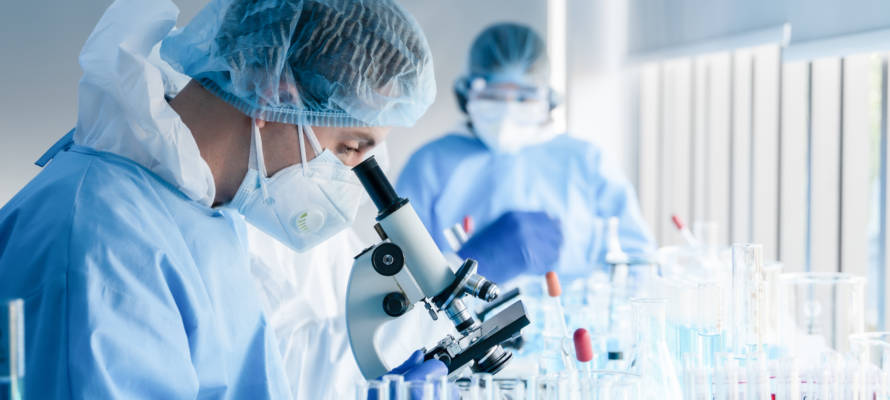The studies — led by Professor Uri Ben-David and doctoral student Johanna Zerbib in Tel Aviv, and Professor Stefano Santaguida and doctoral student Marica Rosaria Ippolito in Milan — discovered two main weaknesses in aneupoloid cells.
By Pesach Benson, TPS
Israeli and Italian scientists identified weaknesses in certain cancer cells that could open a door to new avenues of treatment in a pair of studies.
Researchers from Tel Aviv University and the European Institute of Oncology in Milan shed light on the unique characteristics of aneuploid cells — cells with an abnormal number of chromosomes, which is a common feature of cancer cells.
Aneuploidy is a condition resulting from improper cell division. Healthy human cells have 23 pairs of chromosomes, but cancer cells often deviate from this norm with either missing or extra chromosomes.
The studies — led by Professor Uri Ben-David and doctoral student Johanna Zerbib in Tel Aviv, and Professor Stefano Santaguida and doctoral student Marica Rosaria Ippolito in Milan — discovered two main weaknesses in aneupoloid cells.
These cells rely on DNA repair mechanisms and they also struggle with excess protein production — providing clear targets for new drugs.
Their findings were recently published in the peer-reviewed journals Cancer Discovery and Nature Communications.
“A significant portion of cancer cells are aneuploid, and this trait distinguishes them from healthy cells,” Ben-David explained. “Our work focuses on the vulnerabilities of aneuploid cells, with the aim of promoting new strategies for eliminating cancerous tumors.”
The research built on Ben-David’s previous research which classified approximately 2,000 malignant cells from various cancer types according to their level of aneuploidy and examined their response to a variety of existing treatments.
“In that study, we found new vulnerabilities of aneuploid cells; however, the study had a limitation: because the cells came from different types of cancer, it was difficult to isolate the impact of aneuploidy itself from the effect of other genetic differences between the tumors,” he explained.
To overcome this limitation, the researchers conducted a new study using human cell cultures that were genetically identical.
By adding a substance that disrupts chromosome separation, they induced aneuploidy in these cells, enabling the team to study the specific effects of having an abnormal number of chromosomes.
This allowed them to isolate the impact of aneuploidy and comprehensively characterize these cells through DNA and RNA sequencing, protein level measurements, and CRISPR screening.
Through this detailed analysis, they identified a mechanism called MAPK (mitogen-activated protein kinase), which is crucial for repairing DNA damage in aneuploid cells.
This mechanism was observed to be active in various types of aneuploid cells, including cancer cells in cultures and human tumors.
The research demonstrated that when the MAPK pathway was disrupted, aneuploid cells showed increased sensitivity to chemotherapy.
Chemotherapy works by causing DNA damage, and the impaired DNA repair mechanisms in aneuploid cells made them more vulnerable to this treatment.
Further analysis of clinical data and experiments where human tumors were implanted in mice revealed a direct correlation between the activity of the MAPK pathway and the resistance of aneuploid tumors to chemotherapy.
The higher the activity of this pathway in the tumors, the greater their resistance to the treatment.
Disrupting the MAPK pathway offers the potential of treating cancer patients with lower doses chemotherapy, which would reduce side effects.
The study also uncovered another significant vulnerability of aneuploid cells: an excess production of RNA and proteins due to their abnormal chromosome count.
To compensate for this overproduction, the cells attempt to silence and degrade excess RNA and proteins. The researchers hypothesized that these cells would be more sensitive to drugs inhibiting protein degradation.
Testing this hypothesis, they found that aneuploidy indeed increases the sensitivity of cancer cells to such drugs, a discovery supported by clinical data.
Drugs interfering with the protein degradation could exploit that vulnerability. This could potentially be done repurposing existing drugs to specifically target cancers characterized by high aneuploidy.
Do You Love Israel? Make a Donation - Show Your Support!
Donate to vital charities that help protect Israeli citizens and inspire millions around the world to support Israel too!
Now more than ever, Israel needs your help to fight and win the war -- including on the battlefield of public opinion.
Antisemitism, anti-Israel bias and boycotts are out of control. Israel's enemies are inciting terror and violence against innocent Israelis and Jews around the world. Help us fight back!



